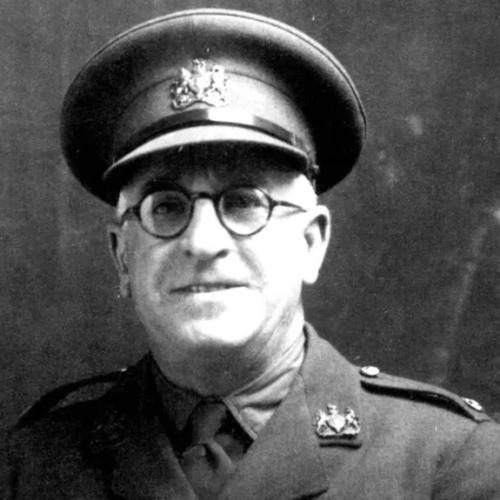
Frank Foley was a British spy stationed in Berlin during the 1930’s who collected intelligence on German military maneuvers and provided visas to thousands of Jews, saving them from Nazi death camps. Unassuming and affable, he is considered one of the most successful spies in British history.
Born in 1884 in Somerset, England, Frank was educated at Jesuit schools and considered becoming a priest but instead decided on a career in academia. He traveled throughout Europe and became fluent in French and German. During World War I, Frank attended Royal Military College and was commissioned as a captain. He commanded an infantry company of the 1st Battalion of the Hertfordshire Regiment.
With his exceptional language skills, sharp mind, and even-keeled disposition, Frank was recruited for the Intelligence Corps of the British Army and in 1918 was promoted to Lieutenant. He was part of a small unit tasked with organizing and overseeing networks of British spies in France, Belgium and the Netherlands.
In 1922, he was sent to Berlin where he was appointed Passport Control Officer at the British embassy – a job that gave him cover for his continuing work as a spy. For the next 17 years, Frank was in charge of British spies in Germany, and he collected important information about the Germans’ military plans.
Nazi persecution of German Jews reached a fever pitch in the 1930’s, and Frank defied the British Foreign Office and issued 10,000 visas enabling Jews to leave Germany. Most went to British-mandate Palestine, and some went to the United Kingdom. If he had trouble procuring visas, he contacted friends working at other embassies and convinced them to give him more. During Kristallnacht in 1938, he hid Jewish families in his own modest apartment. One of those Jews was Leo Baeck, chairman of the Association of German Rabbis.
As a spy, Frank did not have diplomatic immunity and was risking his life to save Jews. Several times he went into internment camps to get Jews out, then hid them in his apartment and gave them forged passports which enabled them to escape to Palestine.
Miriam Posner was a 16 year old girl who traveled from her home in East Prussia to Berlin to get a visa to Palestine. She remembered, “Foley saved my life. We heard that there was this man Foley who was kind to the Jews. My mother begged him. He just paced up and down a little and then asked for my passport and put the visa stamp on it. He did not ask any questions. He was small and quiet. You would never suspect he was a spy.”
In Eichmann’s 1961 trial, one of the witnesses, Benno Cohen, said, “There was one man who stood out above all the others. Captain Foley, a man who in my opinion was one of the greatest among the nations of the world. He rescued thousands of Jews from the jaws of death.”
When the war started, Frank was sent to Norway, but he left behind a large stack of already approved visas, with the names blank, with firm instructions to his successor that they should be distributed to Jews. In Norway, he continued in his official role as a passport control officer. When the Germans invaded Norway, Frank connected the Norwegian commander in chief, General Ruge, with London using his own radio. He was evacuated from Norway by the British navy on May 1, 1940.
In January, 1941, Frank was awarded the Companion of the Order of St. Michael and St. George, a British chivalric honor, for his service to the foreign office. Later that year, Hitler’s deputy Rudolf Hess flew to Scotland, presumably on a peace mission, and Frank, with his impeccable German, was the one who questioned him. The next year, Frank helped coordinate the double agent training and recruitment program at MI5, the British Security service. After the war ended, Frank returned to Germany, where he helped capture Nazi war criminals.
Frank retired to Stourbridge, Worcestershire in 1949 with his wife Katherine. He died in 1958. After Frank’s death, his widow wanted people to know about his heroic actions during the war. She wrote an article for the Daily Mail describing his brave actions saving an estimated number of 10,000 Jews. Frank was honored as Righteous Among the Nations by Israeli Holocaust Memorial Yad Vashem.
On November 24, 2004 – what would have been Frank’s 120th birthday – his descendants, relatives of the Jews he’d saved, Jewish community leaders, British MPs and others gathered at the British Embassy in Berlin to dedicate a plaque in Frank’s honor. Foreign Secretary Jack Straw said, “Frank Foley was a true British hero. It is right that we should honour him at the British Embassy in Berlin, not far from where he once worked.” One of those in attendance, who traveled to Berlin for the event, was 91 year old Elisheva Lernau, who was saved by Frank Foley. She said, “His name is written on my heart… I owe my life to this man I never met, a man of humanity in a time of unparalleled inhumanity.”
Frank’s nephew, Reverend John Kelley, an Anglican priest, said about his uncle, “I believe that God put Frank Foley in Berlin to do His work. Foley did what he did as a witness to the Christian churches to show what they should have done at that time, but did not do.”
Frank was the subject of a book by Michael Smith: Foley: The Spy Who Saved 10,000 Jews (1999). He was named a British Hero of the Holocaust by the British government and the Frank Foley Parkway in England opened in 2009. In 2018, Prince William unveiled a statue of Frank Foley in Stourbridge.
For using his position to save the lives of thousands of Jews, at great risk to himself, we honor Capt. Frank Foley as this week’s Thursday Hero.
Get the best of Accidental Talmudist in your inbox: sign up for our monthly newsletter.